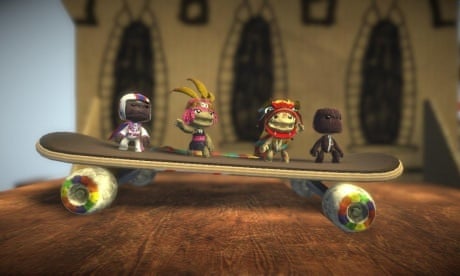I am quite open about my relationship with the PlayStation 3. To date, the Sony console has done nothing for me. Until this week, the machine has sat under a substantial layer of dust and cat fur, discarded in favour of the superior games to both buy and download on the Nintendo Wii and the Xbox 360. I was even able to play SingStar, my traditional favourite party piece, on the PlayStation 2. But that all changed this week when the game I've been looking forward to more than anything in recent memory finally arrived.
Little Big Planet is the brainchild of Guildford-based developers Media Molecule. It has been on the blocks for over two years now, experiencing technological setbacks and cultural hiccups that have delayed it unmercifully. However, now I've had my hands on it, I can wax lyrical and say that it is the most exciting, forward-thinking, well-balanced, casual- and hardcore-friendly console game project I've played. Tall praise indeed.
It is a platform puzzler, taking inspiration from diverse products like Japanese cult game Katamari Damacy, the beautifully choreographed Abe's Odyssee and the ever-innovative Dreamcast's Chu Chu Rocket. So what makes this one so revolutionary? First, it was developed post-Facebook bubble, with a development team that paid attention to what was happening outside the world of gaming. As I've said before, the next revolution in interactive entertainment will come when games and web developers sit down and chat, coming up with new products that are as compelling as games but as accessible as the internet. That seems to be what's happened.
While the Xbox 360 innovated in the social networking space with Live, this is the first major step towards community-driven and community-developed gaming by a mainstream publisher. It's "Game 3.0", as Phil Harrison glibly put it during the LBP announcement at E3 2006. In a nutshell, because it is a game plus a toolset that allows other people to create their own levels, plus a distribution platform with integrated social network and ratings systems, LBP has the potential to be the MySpace of indie games development. Enter new ideas, fewer gatekeepers and more grassroots product.
Second, it is a new IP, which has a freshness that only indie games seem to have nowadays. Third - and I know this shouldn't be important - it looks stunning. Finally, and above all else, LBP has no pretensions.
It's managed to inspire an archaeological dig through my console pile to extract my forgotten PS3. The next challenge is to act as an inspiration for products that build upon it, rather than inspire a new generation of copycats. Can it do it? I think it can.
